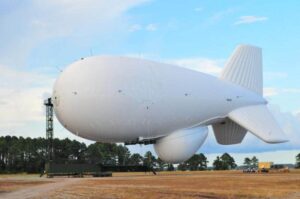TCOMLP, the global leader in affordable persistent surveillance solutions, has announced that it has successfully deployed its revolutionary ultra-durable hull material which enables operations of surveillance aerostats in extreme weather conditions for long durations, meeting the most demanding requirements of US Army’s Joint Land Attack Cruise Missile Defense Elevated Netted Sensor System (JLENS) program.
Responding to its military client requirements, TCOM, LP has developed a revolutionary new aerostat hull material that offers increases in overall strength, strength to weight ratio, environmental resistance against temperature and humidity, and improved helium retention. Together, these attributes enable TCOM aerostats to fly longer at high altitudes, in greater wind and with heavier payloads than any previous generation.
TCOM has applied the new material to its new 71M high Block II altitude heavy lift aerostats in order to meet the demanding US Military requirements of the US Army’s Joint Land Attack Cruise Missile Defense Elevated Netted Sensor System. This next generation of laminated aerostat material is stronger and lighter than all previous designs, allowing the construction of aerostats capable of lifting over 7,000 lbs and surviving winds of 100 kts. The strength is provided by a unique structural layer and is coated with polyurethane adhesive which provides bonding to a laminated film system that includes DuPont Tedlar® film on the outside. The Tedlar® film layer provides excellent weather protection and reduced helium permeance, enabling longer, higher surveillance missions. TCOM’s new hull enables aerostats to operate continuously in winds of up to 100 knots with blowing sand and snow and extreme temperatures of up to 130F.
“JLENS’ 360-degree long-range surveillance capability expands the battle space because JLENS can simultaneously detect and engage threats like swarming boats and anti-ship cruise missiles from up to 340 miles away,” said Dean Barten, the U.S. Army’s JLENS program manager. As the tethered aerostat system supplier, TCOM ensured that the aerostats could remain aloft and operational for up to 30 days while meeting the JLENS altitude and payload weight requirements.
When discussing deployed 71M Block II aerostats, Ron Bendlin, TCOM President and CEO, explained “These aerostats have demonstrated the lowest lift loss of any large class aerostat while increasing strength by 30%. We are proud to support warfighters in the US and around the globe with increased mission endurance and greater availability through reduced maintenance.”
To date, the 71M Block II systems equipped with the new hull material have accumulated over 100,000 hours of use during deployments which include the demanding JLENS System Design and Development (SDD) phase. JLENS operators stated that “the aerostats exceeded our requirements and expectations for helium retention and durability during the demanding SDD phase of our program and the aerostats have been key to making this phase of the program a success.”



















